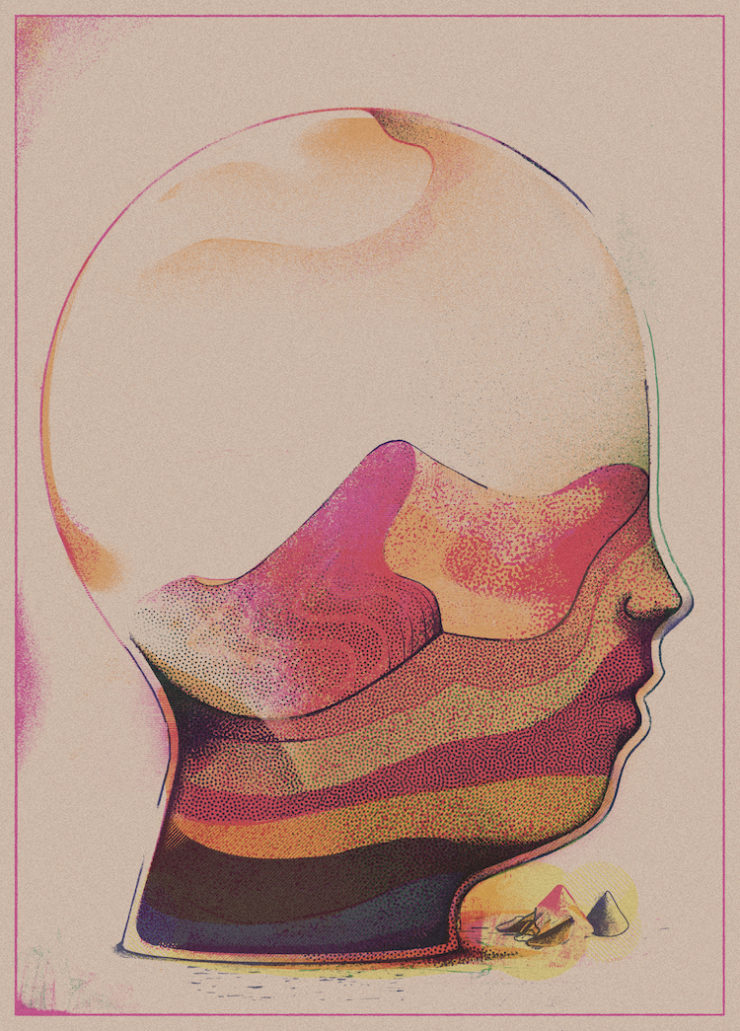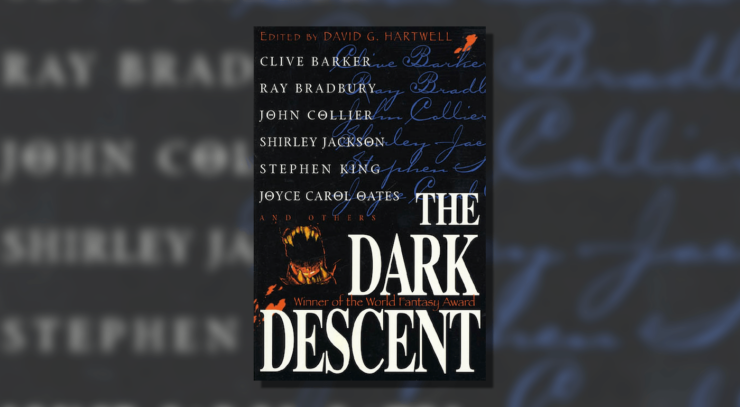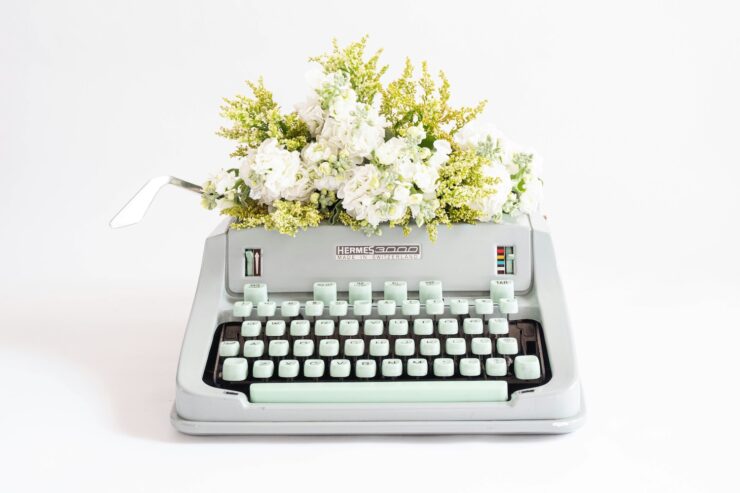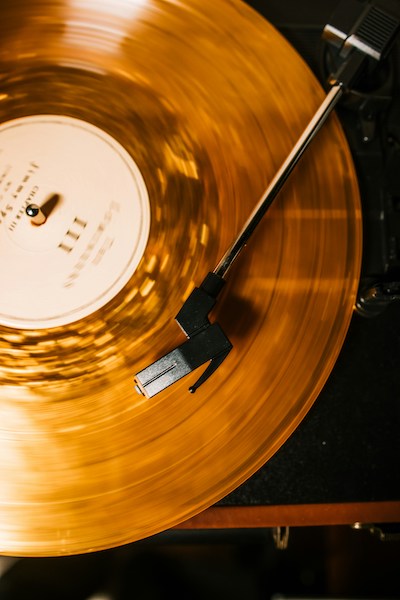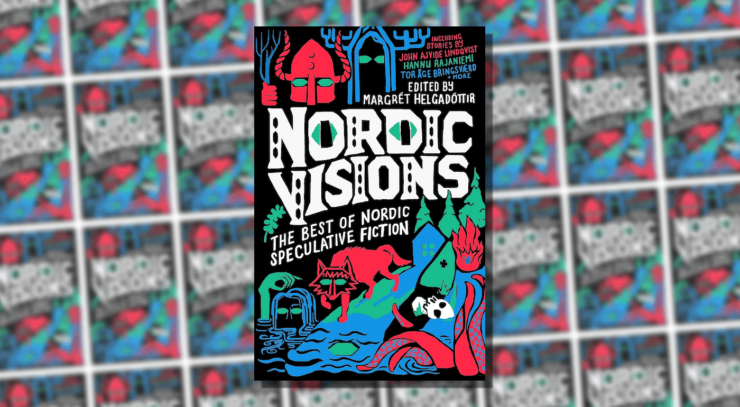When Suzy was born, her parents filled her mouth with sand. But this is normal and natural and the way things are always done.
And if she finds it uncomfortable to keep it there, to eat with it there, to talk with it there, she’s just going to have to learn to live with it.
“Sand” is a heart-wrenching tale about generational trauma and healing.
When I close my eyes, I can conjure the feeling – a smooth gum, wrinkling up as grit scours it. It’s so clear I can almost convince myself it’s a real memory, that I can really recall those rough grains steadily filling my mouth. I can’t. Of course. But the edge of the memory is there, as if the tendrils of my neurons were stretching out to each other across my fresh, pink brain. As if they knew that act would become my bedrock.
In that moment just after I was born, my parents filled my mouth with sand. They inserted a funnel between my lips and tipped it through. The sand trickled into the back of my throat, muffling my squeals, clustering over my tongue and toothless gums.
In this half-imagined memory, Mum clamped me still so the funnel’s sharp base wouldn’t cut my lips. She watched me watching her, and her eyelids fluttered uncertainly. She hesitated, slowing the stream of sand. I took a deep breath through my nose and tried to cry through the grains in my mouth.
My grandparents urged her on, ‘It’s as it should be. Come on now.’ Dad told me that’s how it went.
Buy the Book
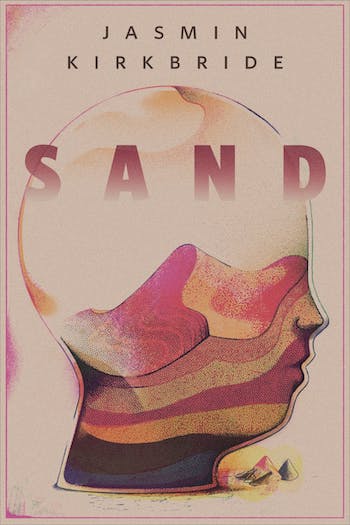

Sand
The doctor paused stitching Mum’s parts back together to watch the sand being poured into me. Mum told me that. Mum glanced at the midwife, who shrugged, holding up a bloodied, gloved hand.
Dad snorted impatiently and tapped the side of the funnel, making the last grains fall into my mouth and turning my cries into a nasal hum that made the sand vibrate.
Mum held me close to feed me, and I imagine the comfort of her warm skin quietened me. ‘Now, just hold the sand in your mouth, darling.’ Her version, again. ‘Don’t swallow it or try to chew it, or it’ll damage your gums.’ I concentrated on straining her breast milk through the granules.
I suppose I became used to the sand quite quickly. After all, there had not been much time before it: my dark gestation (during which my body had changed daily anyway); the flood of birth; scant minutes of air before my parents pushed the funnel into my mouth.
Even so, teething was nightmarish. Ivory spikes punctured my gums and the tiny sand grains got caught in the gaps between them, or in the indents of my fresh molars, causing a low-level, thunder-like grinding when I moved my jaw. When I moaned about it, Mum only rocked me, and told me to just keep holding the sand. I know this is true because it happened again when I lost my baby teeth.
That was when I really began to hate the sand. Around six years old, when childhood amnesia gave way to memory, my conceptual horizons expanded enough for me to understand that the sand hadn’t always been there. I’d spend hours watching my goldfish opening and closing its hollow mouth against the crisp tank water, dwelling on what my first, uncongested inhalations must have been like – what it was like for the air to rush over the roof of my mouth and into my lungs; whether I had been allowed to drink my mother’s milk before the procedure, without straining.
‘What are you thinking about there, Suzy?’ Mum always checked in on me when I stared at the fish tank.
At first, I didn’t respond because talking was too much effort, but she asked me so often eventually I sighed through my nose, tucked the sand into my cheeks, and told her.
She put down her book and flicked her reading glasses off her face into her hair. ‘The sand in your mouth? That’s what you’re thinking about?’
I nodded and hopped off our copy of The Yellow Pages, which I’d been using to boost myself up to the tank. I approached her seriously. ‘I don’t like it. I want to spit it out.’
‘You can try,’ Mum said. ‘But it’ll come back and there’ll be more of it next time. Anyway, it’s bad manners to talk about your sand. People might start thinking things about us. Keep it to yourself, now.’
That afternoon, I slipped into the courtyard that was our garden and tried spitting the sand into one of Mum’s potted ferns, but within an hour it had returned, and my cheeks bulged, fuller than ever.
Dad got wind of my obsession – I don’t remember how, maybe Mum told him, maybe I was stupid enough to let on – and he took it upon himself to advise me.
‘Got to chew it up and swallow it.’ He instructed me over dinner. ‘Here, your mum’s cooking will help – like taking a spoonful of sugar with your medicine. Like Mary Poppins, right? It’s easy.’ He demonstrated with a head of broccoli.
I tried following his example with some of Mum’s signature mustard mash, scooping it into my mouth with my Mr Happy plastic fork. It was not easy. The sand grated all the way down my throat and Mum had to feed me hollyhock syrup before bed. During the night, I sicked the sand back up into my mouth, where it stuck, covered in a foul acidic bile.
‘Didn’t do it properly,’ Dad said in the morning. He remained adamant that I must try again, and it went on – in my memory, though not in anyone else’s – for weeks. The harder I tried, the faster I gagged the sand back up, with a sound like a plunged drain.
‘Jesus, kid, why can’t you just keep it down?’ Dad pointed his cutlery at me. ‘You don’t have to go around with sand in your mouth like that all the time. It’s embarrassing. Look at me, I swallow my sand down and it stays down. Each day with my morning porridge – you’ve seen me, it’s not difficult. It’s your mother’s fault, molly-coddling you like that.’
My vocabulary was growing by then, and though I still understood more than I spoke because the sand made it hard to articulate clearly, I knew that ‘molly-coddling’ was a bad thing.
When Mum dropped me off at school next day, she tried to hug me goodbye like she always did, but I ran away shouting, ‘Don’t molly-coddle me.’ The shout was muffled by the sand, and it came out as a whisper. But I knew from the sag of her shoulders that she’d heard. That, I remember.
I didn’t speak much at school, but once Dad started going on at me, I stopped almost completely. If a teacher really put me on the spot, I’d mumble a few words, one hand over my mouth, but otherwise I was silent. The sand had always been a pain, but now I was self-conscious about it: what if some of the disgusting sand dropped out onto the floor? Or the other children spotted it in my mouth and ridiculed me for not being able to swallow it? I hid in the library at lunchtime and read. The librarian would come and ask me if I needed anything, if I wanted to take that book home with me, if I’d like help finding more books like that one. I shook my head. I couldn’t check anything out; I’d have to speak.
Things came to a head with Molly Sutton’s birthday party. It was going to be a bouncy castle party. There’d be pass-the-parcel, musical chairs, and strawberry Angel Delight topped with whipped cream and rainbow sprinkles. The anticipation of such a magical event spread from the kids to the mums chatting at the school gates – which lucky souls would get an invite? Molly was meant to be my best friend, so Mum was sure I’d get one and gossiped about it all the way home. I thought she was probably right, so I smiled along.
Molly handed out the invites next day. They were My Little Pony themed, with real sparkling glitter in the ponies’ printed hair. She handed them out over lunch, but she didn’t give one to me, which is when I realised I hadn’t spoken to her all term. I panicked, my mouth full of nasty free-school-meal cheese sandwich, and tried to swallow everything – the cheese, the gluey bread, the stupid sand in my stupid mouth. And it all came back up straight away. Cheese sandwich everywhere. Vomit everywhere. Sand. Everywhere.
I was sent to the school office. They called Mum. The headmistress – Mrs Sanders – wanted to talk to us. By that time the sand had grown back in my mouth, and there was so much of it I couldn’t have spoken even if I’d wanted to. Mum and Mrs Sanders talked over me in those particular grown-up voices they thought kids couldn’t hear.
‘She says she was trying to swallow the sand in her mouth.’
‘Oh, it’s her father. He’s…very set on the idea.’
‘Mrs Parter, it’s not healthy. You really should dissuade your husband from encouraging it.’
‘It’s just the way he’s always done it,’ Mum said.
‘Yes.’ Mrs Sanders folded her hands in her lap. ‘Well.’
On the way home, Mum talked to me about it directly, told me not to swallow the sand, to ignore Dad. I had several responses lined up – it wasn’t that simple, he shouldn’t have put the sand in my mouth in the first place, if it annoyed him so much he could have chosen not to like the other kids’ parents, and anyway I was sure I could swallow it down if I just got a little more practice – but my mouth was still too full to get any words out.
‘Did you at least get an invite to Molly’s party?’ Mum said as she unlocked the door.
I shook my head.
‘What? Why not? I thought you and Molly were friends.’
I shrugged and ran upstairs to where my books were. Later, I heard her on the phone to Molly’s mum. ‘I just don’t understand. They were so close all last year…Yes…Yes…Well, if Suzy really doesn’t talk then…I suppose…Sure, I understand…’
I had imaginary friends after that. I preferred them: I could talk to them in my head, and they didn’t tease me about vomiting in the lunch hall. If I was asked a direct question in class, I’d answer, but I always held my hands in front of my mouth, to stop people seeing inside. I got away with it for years.
But eventually, at their wits’ end, my high school teachers brought my parents in again. ‘She doesn’t make friends. She spends every lunchtime alone in the library. Her grades are excellent, but we’re worried about her. She’s thirteen years old, she should be better socialised by now.’
Mum took me for a drive into the wide, flat countryside. She pulled into a ploughed field and turned off the engine. She turned to me, face soft as milk. ‘All right. Enough of this. What’s going on?’
I clutched my seatbelt and shook my head. Nothing.
‘You know, whatever it is, you can tell me…’
Another shake.
‘Come on now, you can tell me. Something’s going on. Are the kids at school being mean or something?’ She stroked one of my shoulders, and the molly-coddling felt good, as if I could fall into her and she would catch me however heavy I was.
‘It’s the sand,’ I whispered.
‘The sand?’ She frowned, as if she rarely remembered the day she and Dad had forced the funnel into my mouth and tipped the sand inside me. ‘You’re not still on about that are you? Have you been trying to swallow it again? Honestly, your father’s such an idi–’
‘No, no, it’s not that. I just hate it – I hate it. The other kids kill me if they found out I’ve got a mouth full of sand.’
Mum laughed at me. Fully laughed. I jumped out of the car and slammed the door, scratching away hot tears. Mum got out quietly, trying to make her face serious.
‘Darling.’ She giggled again, then composed herself. ‘Darling. God, you poor thing. Do you think you and your father are the only people with sand in your mouths?’
‘Aren’t we?’
Mum shook her head. She did something odd with her cheeks that made them very gaunt, then opened her mouth wide. I looked, and saw it was full of sand. It wasn’t the same yellow grit that was in my mouth, but a grey volcanic dust, so fine it must have threatened to choke her with every breath.
‘How do you hide it so well?’
She shrugged. ‘Practice.’
I gazed at her, trying to connect ‘mum’ to ‘sand’ but it was like she’d melted in front of my eyes and I couldn’t make her solid again. I pressed the feeling down, cementing it in my stomach. ‘Whatever. You don’t count anyway. You’re family.’
‘Suzy.’ Mum shook her head. ‘Everyone has sand in their mouths.’
The earth shifted.
It seemed so obvious in retrospect – but I’d never seen someone without sand in their mouths, so of course I didn’t wonder why everyone’s cheeks were so chubby, or why there was a little pause before anyone talked or ate as they tucked the sand around their gums, or why we tended to whisper and say things that were quick rather than the things that we meant. I just thought humans were naturally chubby-cheeked clumsy inarticulate clods.
And of course, nobody had ever set me straight. No one – but no one – ever talked about sand. Not unless they absolutely had to, unless someone made them, the way I was making Mum now.
‘Holy sh–’ I glanced at Mum ‘–ugar gumdrops.’
‘Yeah,’ said Mum. ‘Holy shit.’
I laughed as well then, so hard the sand did nearly drop out of my mouth. I didn’t even care. ‘We all have sand.’
‘Right. You just have to hold on to it and keep going.’
‘But what about swallowing it down like Dad says?’
Mum’s face fell. ‘You know I don’t like to badmouth your dad, but he really is an idiot. Anyway, if he was able to keep his own sand down so very well, do you think he’d be so cruel to you about yours? You watch next time he’s eating – there’s more sand in his mouth than in the bloody Pacific Ocean!’
We got back in the car and drove home. That night over dinner, I watched Dad as if he were the last ten pages of a thriller. Mum was right: there, amongst the half-masticated roast chicken and coated in gravy, were fine grains of sand, so slick and white they must have squeaked against his teeth when he swallowed. No wonder he was so set on getting rid of the stuff.
I tried to be angry at Mum for not telling me sooner but I couldn’t keep it up. She’d been trying to protect me, thinking the more you talked about sand, the more risk there was people might think odd things about you and your family. Plus, she’d honestly believed I already knew. This was knowledge I was supposed to have gleaned through osmosis, but somehow the umbilical parcel of information hadn’t been passed on. Was that my fault? Or did everyone secretly have this moment, where their world fell apart and came together all at once? I wondered how many other people didn’t yet know, and the thought they might not made me feel special and adult.
The other kids at school had mouths full of sand too. Some of them would try to swallow it down at lunchtime like Dad did, but if you watched closely, you could see them spewing it back up into their cheeks in fifth period. Molly Sutton was the worst for it. I felt sorry for her. I started talking again just to tell her that it was OK – everyone had sand in their mouths, and it didn’t need swallowing. Molly started weeping, right there in the dining hall in front of everyone, so me and her group grabbed our lunchboxes and went outside to eat our crisps under the conker tree on the big pitch. We didn’t keep talking about the sand. We talked about the boys, and hot Mr Henderson the history teacher. The others talked about what they were going to wear to Molly’s latest extravagant party. Her dad owned a nightclub and he’d booked out the whole thing for her on Saturday afternoon.
‘You should come, Suzy,’ Molly said. ‘The DJ’s coming all the way from London. And Dad’s hired a special Slush Puppies machine. He says he can reuse it for cocktails in the bar afterwards. You know, once we’re done.’
‘Sounds good.’ My words were still muffled – but so were everyone else’s.
I had fun at Molly’s party. The girls clung to one side of the room, and the boys the other – a trend Molly and Joe Sturridge scandalously broke to head bang to Alice Cooper. Shouting along with the lyrics, I put my hands up for the DJ, reaching for the lasers for the very first time.
When I turned fourteen a month later, my party wasn’t as big or glamorous. But I did have a party, and enough people turned up to make the Pizza Hut staff tut about shuffling extra tables together. I got birthday cards and Molly bought me a pair of sequin hot pants that we kept hidden from my parents.
All that summer, we hung out on the big pitch, even after school finished – it was a huge, free space to hang out in, and that was all that mattered to teenagers strapped for cash. I cut my hair short and dyed it black with blue streaks in the bathroom sink. I made mix CDs and we played them on Joe’s portable CD player. The boys played ultimate frisbee and Molly taught us all poker. We’d play for Haribo. Sometimes, when the sun was low and the shadows stretched over us, I would try to talk about the sand, but nobody else ever wanted to.
It was around then that my parents started rowing. They’d always bickered – you know, like married couples do. But then they started shouting, loud enough that Dad woke up hoarse and Mum busted the blood vessels in her eyes. They yelled so hard that grains of sand flew out of their mouths, landing on the furniture, the slammed doors, each other, me. I ran from their arguments and put on loud music in my room, trying to pick the grains from between my toes, under my fingernails, inside my ears. Sand flicked out of my hair if I nodded or laughed too vigorously. It became harder to hold the sand in my mouth and I worried it was growing somehow. I tried to talk to my friends about it, but by then we were all occupied with university applications; they didn’t have time for sand.
By the time Mum and I packed the car with my things and drove me up to uni, there was so much sand in my mouth that my cheeks felt bloated and ancient. My mouth was so tight I could hardly breathe, let alone speak, and for the first time I wondered if the sand could be multiplied by external events.
When Mum dropped me off, I hugged her tight. She felt so thin and I realised that, at some point in the last year, I’d grown taller than her. ‘Thank you for molly-coddling me.’
She smiled. We both tried not to cry.
My flatmates were delinquents – but then, so was I. We drank until we couldn’t feel our stretched cheeks and tender gums, smoked so much pot we didn’t have to think about exchanging sand when we kissed. We went to clubs where the bass was loud enough to drown out the grains grating against our teeth, and attended classes inconsistently so that our lecturers didn’t register our downward spiral.
Mum called me in early December to tell me it would just be the two of us at Christmas.
‘Where will Dad be?’
‘He moved out.’
‘Oh.’ I held the sand tight, formed my words around it and between it and through it. ‘That’s probably for the best.’
‘Yeah.’ The word was muted, reminding me of the volcanic sand in Mum’s own mouth. So dark, from the depths of the earth. What must that sand feel like to hold, compared to the easy grains I had?
‘Are you OK?’
‘Yeah. Sure. Like you said, it’s for the best.’
Dad didn’t bother calling – perhaps he was too busy trying to swallow his sand – but he’d be in touch again sporadically over the years.
It was a quiet Christmas, Mum and I both just focussing on holding tight and not letting a grain spill. It was the first quiet Christmas I could remember, and when I went back to uni I drank more, smoked more, went to even louder raves.
I’m not sure how I graduated, or how I managed to get a job, but both events occurred. I would dress smartly during the day, holding my sand behind my worn, nicotine-stained teeth, and at night slouch into my pyjamas and sift through a bottle of shiraz. My sand turned dark purple from all the red wine, and the colour never quite washed away with toothpaste. I was an all right employee to a mediocre boss in a stale high rise, and a lousy girlfriend to an even lousier boyfriend in an ex-council flat.
Mum came to visit when she could. We chatted about the surface of things until, just after I turned twenty-six, she pinned one of my hangovers down with artisan lattes and made us talk.
‘I owe you an apology,’ she said.
‘Why?’ I was half on my phone, and she snatched it out of my hand. ‘Hey –’
‘This is serious, OK? I really need to apologise and I need you to listen to me. I’m worried about you.’
I sipped my coffee. ‘OK. Shoot.’
‘Remember when you were a kid and you had trouble making friends? And I said everyone has the sand inside their mouths, and we all just have to hold on to it?’
My gums ached. ‘Yeah.’
‘Well, that isn’t true. You don’t have to keep carrying the sand.’
‘What do you mean? You mean you didn’t have to put it in my mouth all those years ago?’
‘No, that was unavoidable. I didn’t want to though, of course not – I feel so bad about it – I tried so hard but…it just happens. Despite our best intentions. I mean, you’ll understand when you have children.’
‘If.’
‘Sure, if you have children. But just because it’s in there doesn’t mean you always have to carry it.’
‘I can’t spit it out. I tried.’
‘No, not spit it out. Christ. No, you kind of swill it. It’s hard to explain, but there are people out there who can help you learn how to. They’re called sifters.’
‘You swill the sand?’
‘Uh huh. I know it sounds weird but give it a go. I’ve been doing it, and it’s worked wonders for me.’
That night I lay in bed and tried swilling the sand. It scratched my tongue and the roof of my mouth, and the thunderous sound I’d been hearing since my teeth grew became unbearably loud. I’d only had half a bottle, but it hit hard, and I started crying. Swilling wasn’t something to do alone: like Mum said, I needed a sifter.
I found a woman not far off Mum’s age, who had a sunny office on the outskirts of Harringay. She would lay me down on a purple corduroy couch and hold my jaw while I swilled, talking me through the movement of each grain, and applying disinfectant to the soft, red flesh of my mouth where the sand’s movements scraped my gum.
My lousy boyfriend found it all too much and left me. I appealed to my boss for extra sick pay, which he denied, so I ended up freelancing on next to no money. I worked from bed, from coffee shops, from the postage-stamp, pigeon-infested balcony. I dropped my party friends and got a lodger with a pet rat. I poured my wine down the sink and started taking vitamin supplements. Every change took weeks or months, each one a fight against the fear in my stomach that any moment now, the sand would not diminish, but grow and choke me. I would wake up crying from dreams in which the sand had trickled into my lungs like an hourglass and suffocated me, or that I couldn’t stop vomiting up beaches’ worth of sand, fine grey and silky white.
‘You’re doing so well,’ my sifter said after I’d been attending sessions for almost a year. ‘It’s very brave of you to come here and I think you could be sand-free one day.’
I laughed at her. It was unimaginable.
But the sand was changing: the grains were becoming thinner, mixing with my saliva to form a tacky paste which some days made it impossible to talk, but others let me speak louder than I’d ever been able.
Shortly before my thirtieth birthday, I woke up to find my mouth was empty. I ran my tongue over the ripples on the roof of my mouth, my glossy teeth and chapped gums. I could feel my saliva glands wetting my cheeks. I examined my mouth in the bathroom mirror. For the first time in my life, when I opened my lips, all I saw was the white of my teeth, the pink of my gums still red in places from the rubbing sand, and the darkness beyond that, which made a clear passage all the way through to the base of my lungs. I sucked in a breath, feeling the dry oxygen rush against the roof of my mouth. I listened for the thunder of grating sand, but it was gone. Silence. And it was all mine to fill.
No, my mouth wasn’t quite empty. A small, round object was tucked into one of my cheeks. I flicked it onto the end of my tongue and frowned at it in the mirror. I started laughing, uncontrollably, until my flatmate came to see what the matter was. We celebrated with cake and a double dose of vitamin supplements.
‘You seem different,’ Dad said next time I saw him. He swirled his ale and shifted in his beer garden seat.
‘Well, I am,’ I replied. I watched the condensation forming on my half-pint of lemonade as I told him about the sand-swilling.
He told me it was all nonsense. Of course. ‘You’ve just got to keep swallowing the sand, that’s the way.’
I took a sip, enjoying the sparkle of carbonated bubbles. ‘Well, it works for me.’
I made sure my next boyfriend wasn’t a sand-swallower. Like everyone, Thomas had been born with a mouth full of sand but, like me, it got too much for him.
‘I couldn’t leave the house without double-checking the gas was off, the hall light was on, and the door was locked,’ he said. ‘Five times each. I’d normally get it wrong and wind up starting again. Usually, I wouldn’t make it out of the house.’ It was about four months into our relationship, a Saturday morning in bed with mugs of gunpowder tea. He couldn’t look at me as he told me about it, smoothing the sheet down again and again. ‘If I didn’t do it, I was convinced my dog would die. Then I’d be all alone.’ He paused, looking at me as if I were a priest he’d just confessed to. ‘That sounds pretty weird, doesn’t it?’
I thought about vomiting my sand up in the lunch hall at school all those years ago. About watching my goldfish’s mouth making hollows against the tank water. About the purple stain my sand used to have from my drinking. ‘No. It doesn’t. We’ve all got something.’ I told him everything. We didn’t get married for a couple of years after that, but when we look back, we both agree that was the moment we knew it would happen.
We took our honeymoon in Cornwall, in a badly sound-proofed caravan we borrowed from a friend. Rain thundered on the aluminium roof all week. I was tired, and grouchy, and dizzy – and, checking my Clue app, late. On the way home, in a Starbucks toilet off the A303, I took a pregnancy test. Two little blues lines appeared in amongst the reek of bleach and old piss. I went back to the cafeteria and showed Thomas.
‘Is that a pregnancy test?’
‘Yeah.’
‘I don’t think it’s sanitary to put that on the table, y’know.’
‘Tom, come on. This is serious.’
‘Yeah, I know. Why do you think I’m making jokes?’
We paid up, went back to the rental car, and drove on in silence.
Ten minutes from our front door, he said, ‘Do you think we’ll have to do it? To put the sand in his – her – their mouth?’
‘Maybe not. Maybe we won’t have to. I mean, we’ve done so much work…’
He stopped at a red light and turned to me, hands still on the steering wheel. ‘But it’s worth the risk, right?’
‘Oh definitely. Definitely worth the risk. And we’ve done so much work. We’re different to our parents. Right?’
He took a hand from the wheel and squeezed my knee. ‘Right.’
Twenty-two days after I conceived my daughter, when her heart was the size of a poppy-seed and started to beat, the postman delivered a paper bag.
There are things about parenthood you can’t really know until you’re a parent yourself – not because they put you on a higher plane of existence, just because they’re too weird or difficult to explain. The paper bag is one of them. All parents get them. One for each child. They’re white airsickness bags, with simple instructions printed on the front in navy blue and a clear, plastic funnel inside. There’s a slightly different process if you adopt – you have to send the sand to the adoption services ahead of time – but you still get sent the paper bag. It’s a whole thing. If you’re a parent too, you’ll know what I’m talking about. The instructions are pretty out there, but you follow them anyway. You spit into the bag – just you if it’s just you, but your partner too if they’re around – then you seal the bag up and leave it under your bed until it’s time for the birth.
In that time, the sand grows, mixed from your collective spittle inside it and your sleeping position over it. It absorbs your conversations, the music you play, soaks in the places you go, the friends you meet. You can’t avoid it; it’s just what happens. You can’t unseal the bag. You don’t get to see the colour or weight of the sand you have to put into your child’s mouth until they’re born. It wouldn’t matter even if you could: by that point they exist, and so the sand exists. It’s inevitable.
That, for me, was the painful part of pregnancy. The birth was a pinprick by comparison.
I went into labour in the dark, and she was born quickly, my little girl – so fast that I barely hit the hospital bed before she slid out into the world. My husband and I shushed her and held her. Then we opened the bag. There were no grandparents present this time, unlike at my birth, but perhaps my daughter could sense them anyway, standing invisibly around us, with the greats and the great-greats and the great-great-greats…
Tom opened the bag. His hands shook as he pulled apart the neck and looked inside. He cried, his whole body shaking.
‘What?’ I said, frightened about what terrible weight we might have produced between us.
He reached inside, pulled out the contents and opened his palm. He held a clutch of pearls, all tiny and creamy-pink with newness. So little to hold, and so smooth; there would be no thunderous grating for our daughter, no stretched cheeks, no straining mother’s milk or wine through a mouthful of sand.
We tipped the pearls into our daughter’s mouth and told her together: ‘Don’t swallow them now, just hold them in your mouth, and when you’re old enough, we’ll help you figure out what to do.’
But her eyes widened, straining to understand what little they could see – and behind them, her neurons stretched towards each other, trying to commit this moment to memory. Maybe she managed it, and has the whole recollection, perfect and complete, like a smooth gum wrinkling in her mind’s eye. I suppose I’ll find out, when she’s older.
Buy the Book


Sand
“Sand” copyright © 2021 by Jasmin Kirkbride
Art copyright © 2021 by Juan Bernabeu










